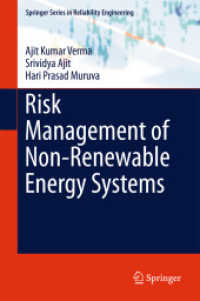- ホーム
- > 洋書
- > ドイツ書
- > Social Sciences, Jurisprudence & Economy
- > Politics, Society, Work
- > miscellaneous
Full Description
The transformation of the dominant model of centralized energy production from fossil fuels to renewable energies is at the center of the public and scientific debate, as well as the subject of national and European policies, as it is connected to highly topical issues such as climate change, emissions reduction and natural disasters, security of supply and sustainability of the current economic development model.
Up to now this topic has been mainly addressed by the economic and engineering sciences, with a research focus on the hardware rather than on the human and social software.
However, energy systems, and the possibilities of change, are not only economic or technological but involve also patterns of social life, representations, organizational models and relational structures. In order to generate the social preconditions for the transition to a low-emission society, focused on a growing production of energy from renewable sources and on a greater sustainabilityof consumption, it is therefore urgent to reaffirm the centrality of a sociological approach to energy.
This book focused on three core research areas which are crucial to understand what is at stake with the energy transition: conflicts over the construction and location of renewable energy production plants; collective action on renewable sources that promote a new model of energy system in which consumers are also producers; and the social-territorial impact of energy policies.
Contents
Chapter 1: Introduction.- Chapter 2: The emergence of the sociology of energy.- Chapter 3. Civil society and conflicts over renewable energies beyond the NIMBY syndrome.- Chapter 4. The social and spatial (in)justice of the energy transition policies.- Chapter 5. Community renewable energies between social enterprises, social movements and hybrid networks.- Chapter 6. Some lessons on energy transition learned from the Italian case.








